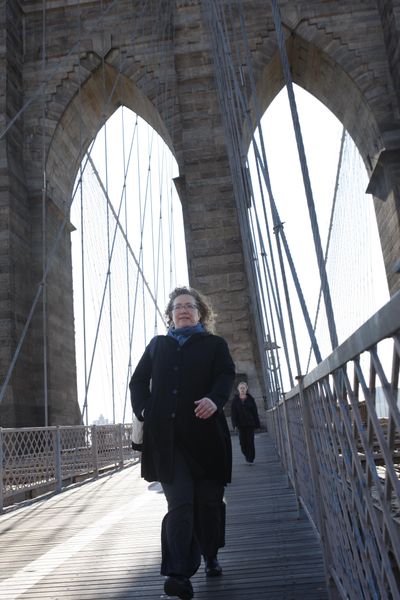Saving daylight not a fun time for clock folks

Turning clocks ahead for spring is a ritual some people love to hate.
We’re groggy. Our kids are cranky. While it sits better than fall’s theft of afternoon daylight, still we grumble.
Does anybody have anything nice to say about Daylight Saving Time?
New York City’s Camilla Brooks does. She celebrated early with a walk across the Brooklyn Bridge.
“I get a little giddy,” she said. “I think I touch into that child-self that looks forward to running and playing in the park.”
For weeks, Erika Blanchard of Myrtle Beach, S.C., has been counting down to Sunday’s start on her Facebook page.
“I’ll resume my evening walk with my husband,” said Blanchard, who is known for throwing office celebrations on the first Monday of daylight saving to mark the occasion.
“I really love the extra light. Sleep is all I want to do when it’s dark.”
Filmmaker Sondra Lowell of Los Angeles loves it, too, so much that she shifted time a week early.
“It’s like being on vacation every day,” she said. “What am I going to do with my extra hour (of daylight)? Nothing. Just nothing. Yay!”
Ben Franklin was a fan of the idea during his Paris days in 1784. Imagine, he wrote to a newspaper, how many candles could be saved if people woke up earlier in the warmer months.
He jokingly proposed taxing window shutters, rationing candles or firing cannons at dawn to “wake the sluggards and open their eyes to their true interest.”
But the idea of moving clocks forward in summer didn’t come to fruition until World War I, when Germany acted on the notion that natural light could replace the artificial kind, saving fuel for the war effort.
Now, about 70 countries observe daylight saving in one form or another, affecting well over 1 billion people, said David Prerau, author of “Seize the Daylight: The Curious and Contentious Story of Daylight Saving Time.”
“Most people like it,” he said. “It’s generally popular. They find the extra hour is much more usable if it occurs in the evening than in the morning, and it doesn’t cost a dime.”
In the United States, daylight saving was extended in 2007, now running from 2 a.m. on the second Sunday in March to 2 a.m. on the first Sunday in November.
There are haters. They live in Indiana, one of those states split between two time zones with a patchwork history of timekeeping.
Gov. Mitch Daniels imposed daylight saving statewide after his re-election to a second term in 2008.
“My family is already sick of hearing me complain about DST and we haven’t switched clocks yet!” bemoaned Heather Sokol, a mother of three in the Indianapolis area.
“First, it’s not good for the children – the extra hour of daylight at night means young kids can’t get to sleep on time,” she said. “Most of them get up at the same time the next day anyway – either out of biological habit or the need to get to daycare or camp on time.
“The lack of sleep really adds up. We’re forced to purchase melatonin regularly to force our girls’ circadian rhythms.”
In urban areas when fall arrives, Sokol added, many kids are “stuck waiting in the dark for a school bus. Very dangerous!”
Prerau’s reality check: Some research has indicated an increase in accidents for a few days after the start of daylight saving, possibly due to sleepy drivers.
But other studies have shown overwhelmingly that shifting light into evening has reduced accidents by 1 to 2 percent a day throughout the eight-month period.
“I absolutely hate the going back and forth with the clock,” said another hater, Ruby Kamaka of the San Francisco Bay area. “It is not healthy for the body. It’s like having jet lag without benefit of having traveled.”
Prerau’s reality check: Eventually, the circadian rhythms of most people, including children, do make the adjustment and the added daylight at a time when people can be outside offers more of the sun’s nourishment.
“It definitely does cause some inconvenience, but if you think of all the benefits, that’s the trade-off,” he said.
In addition to research indicating continued savings on energy, a federal study based on crime data showed consistently less violent crime during periods of daylight saving over comparable periods of standard time, said Prerau, who was a congressional consultant during the effort to stretch out daylight saving.
Crime, perhaps. Groggy workers, not so good.
Researchers at Michigan State University recently found an increase in workplace injuries of more than 5 percent on the first Monday after clocks move forward.
The debate is moot in Hawaii and Arizona, the only two states to ignore daylight saving altogether.
“I’m glad we don’t participate,” said Kevin Caron, a Phoenix sculptor. “We have enough sunshine, thank you very much.”